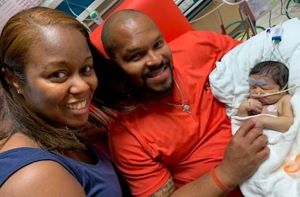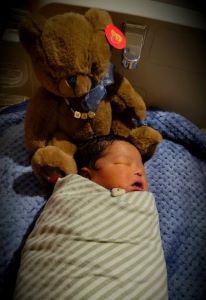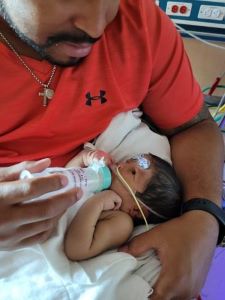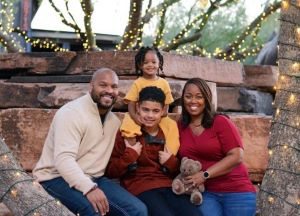- Center for Fetal and Neonatal Care
- Congenital Heart Disease
- Research
- Fetal Care
- Palliative Care
Lessons Learned from Baby’s Malformed Heart May Help Heal Others in the Future

Before his birth, Maurice Axel C. – nicknamed “Mac” as an acronym for his full name – was diagnosed with such complex heart deformities that providers didn’t expect him to survive the pregnancy. However, he was born full term in June 2021, and lived for 10 days filled with cuddles and kisses from a loving family.
After his death, Mac’s parents, Chanela and Vince, donated his heart, brain and placenta to science. Now, medical researchers at Phoenix Children’s and beyond can study these organs to learn more about fetal development.
Though Mac’s life was short, he leaves behind a legacy that may help babies survive similar heart malformations in the future.
“By donating Mac’s heart and brain tissue to science, maybe his purpose is to help find a cure for somebody else down the line,” Chanela says. “That's comforting for us.”
Devastating Diagnosis

Chanela and Vince – already parents to a teenaged son and toddler daughter – were looking forward to getting a glimpse of their third child during their 21-week ultrasound in February 2021. But their joy turned to concern when their OB/GYN observed potential problems with the baby’s heart. They were referred for a second ultrasound the following week with a different OB/GYN.
“They told us that it might be nothing – that the baby's positioning could be obstructing a full view of the heart,” Chanela recalls.
When the second ultrasound at 22 weeks also revealed heart abnormalities, the couple was sent to the Fetal Care Center at Phoenix Children’s for a fetal echocardiogram (“echo”). This special type of ultrasound allows doctors to see the structure and function of an unborn baby’s heart.
The results were devastating. The baby’s heart had multiple deformities, including narrow and weak pulmonary and aortic valves. Additionally, the heart muscle was so thick that it was unable to pump properly. Fetal and pediatric cardiologist Robert Puntel, MD, who performed the echo, didn’t think the unborn baby would survive to full term.
“The baby had unusual heart defects and very poor function,” says Dr. Puntel, one of four fetal cardiologists in Phoenix Children’s Fetal Cardiology Program. “It is extremely rare to see both main vessels to the heart significantly stenosed, or narrowed. There would be no surgical option if this baby were to survive, except to possibly use ECMO – a heart/lung machine – immediately and hope for a possible heart transplant. But we knew that was unfortunately not likely.”
Walking Alongside Families
Dr. Puntel continued monitoring Mac’s development throughout the pregnancy, performing additional fetal echo tests and fetal magnetic resonance imaging (MRI). Additionally, Fetal Cardiology nurse coordinator Laura Bardeguez, RN, organized appointments and worked closely with Chanela’s Ob/Gyn to ensure a seamless transfer of Mac to Phoenix Children’s.
“We are a vehicle for these families to process and get the help they need prior to the baby coming,” Bardeguez says. “There are so many people involved in their care. These families can get so overwhelmed from being pregnant with a sick baby and being introduced to so many different specialists and tests and scans and bad news – sometimes they don’t know where to turn when they have questions. My job as a nurse coordinator is to help them navigate this very difficult path and offer them concierge services. I walk this journey with them.”
Bardeguez also referred Chanela and Vince to Phoenix Children’s Palliative Care Program, which supports and advocates for families of children facing serious, life-threatening and life-limiting conditions. Palliative care specialist Billie Winegard, MD, MPH, met with the couple just a few days after the heartbreaking diagnosis. Chanela and Vince wanted to have a plan in place. Dr. Winegard helped them develop a birth plan to ensure they would have a chance to meet Mac, even if he passed away in the womb.
“In palliative care, we really feel like we can do the best work and support the family most effectively if we meet them from the time of diagnosis,” Dr. Winegard says. “In our world, it’s paramount to honor what’s most important to the family and their goals. If we get to meet them from the beginning, we can have those conversations and help the medical team keep the family’s goals in mind when we’re working together to develop the plan of care.”
“Sometimes in medicine, we let the fact that we can do stuff drive the care,” says Dr. Winegard, adding that palliative care is not just end-of-life care. “We forget to stop and ask if what we can do fits with what’s most important to the families.”
Fighting for Life

Mac was delivered at 38 weeks, weighing 6 pounds, 8 ounces, and measuring 20 inches long. According to his mother, he actually looked healthy.
Five hours after his birth, Mac was transferred to the Cardiovascular Intensive Care Unit (CVICU) at Phoenix Children’s. The CVICU team is made up of pediatric cardiac critical care physicians with specialized training and congenital heart disease expertise. They oversee the clinical care of critically ill children with cardiac conditions who are admitted for surgery, cardiac catheterization or illness.
For a few days, Mac seemed stable and was able to breathe on his own. Chanela and Vince enjoyed bathing, feeding and cuddling him. They also had the opportunity to take pictures and create mementos with Mac’s feet and handprints.
“He opened his eyes for us,” Chanela says. “He was just so wonderful. You couldn't tell anything was wrong with him from his appearance.”
When Mac was 5 days old, he underwent a catheterization to give doctors a closer look of his heart’s structure and function. The procedure confirmed many of the findings made during the baby’s time in the womb. However, the discovery that Mac’s aortic valve was leaking significantly meant there were no surgical options.
Within days, Mac got a bacterial infection. With the infection and his heart problems, Mac quickly got sicker and sicker. The palliative care team supported the family throughout this time and helped bring together Mac’s siblings and other family members to meet him.
At just 10 days old, Mac passed away in his father’s arms, surrounded by his loving family.
Remembering Mac
Mac’s donated organs have been used for teaching others. Through this donation, current and future doctors in cardiology, neonatology and obstetrics can better understand embryo development and congenital heart abnormalities. Dr. Puntel hopes that can help drive better treatments in the future.

“We’re able to process what we saw prenatally on the echo and MRI and ask ourselves if we’re making the right diagnoses and if any treatment options could improve prognosis,” Dr. Puntel says. “This special baby will impact teaching and research for a long time. The family was exceptional. They were grieving but, at the same time, able to come outside of themselves and think about Mac’s legacy.”
After Mac’s memorial service, Bardeguez presented Chanela and Vince a 3D model of the baby’s heart, made from MRI images. It’s one of the keepsakes the family cherishes, along with a teddy bear implanted with a recording of Mac’s heartbeat, which Bardeguez gave them after their first echo.
“The 3D heart was the most beautiful thing and the best gift I could have ever received,” Chanela says. “That's the piece of him that made him who he was, and we keep it on display in our living room. We are grateful for the team we had at Phoenix Children's – all of them were just so kind and caring. They are like family.”
